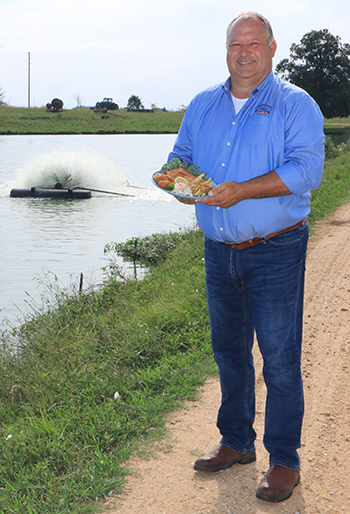Willard Powe Chosen As Catfish Farmer Of The Year

Willard Powe said he never saw a catfish farm while growing up in Wilcox County. But meeting his sweetheart and future wife, Dea, helped him catch a new interest and his eventual career.
“Dea and I dated in high school and married in 1988,” said Powe, 51. “I worked construction during the week and worked weekends on the farm while she finished college. Dea’s dad (Butch Wilson) offered us an opportunity to move here and work on the farm full time. It has been a great experience for our family. Our children (Trey, 23, and Carrie Lea, 20) were fortunate to grow up on the family farm. There are not many people who can say their children are the seventh generation to grow up on the same land.”
Powe was selected by fellow members of the Alabama Catfish Producers as the state’s Catfish Farmer Of The Year. In February, he joined honorees from Mississippi and Arkansas at Seafood Expo North America in Boston. The trio served catfish samples to seafood buyers from around the world while sharing their farms’ stories.
“It was an honor to represent our state’s farmers at the seafood expo,” Powe said. “We have a good story to tell, and I think the buyers appreciated the fact we actually grew the fish we served. We were able to tell them that our farmers grow the safest, most sustainable fish on the market. We control the water quality in our ponds and feed our fish a high-protein, grain-based diet. U.S. Farm-Raised Catfish is inspected by the U.S. Department of Agriculture (USDA), and we have the world’s strictest guidelines to raise and process our fish.”
August is National Catfish Month, which has been observed in the U.S. since 1988. It recognizes the industries surrounding catfish, and it’s also dedicated to the versatile and sustainable food catfish has become.
Alabama Farmers Federation Catfish Division Director Mitt Walker said catfish play a significant role in the state’s economy with more than 1,000 Alabamians directly engaged in catfish production or processing. The state’s top catfish-producing counties are Hale, Green, Dallas and Perry counties.
“Alabama farmers produce 30% of all catfish in the U.S. annually with over 100 million pounds of fish grown on 80 farms,” he said. “Our state has nearly 17,000 water surface acres dedicated to catfish production.”
Walker praised catfish farmers for supporting USDA’s inspection program, adding that imported fish have hurt U.S. farmers by flooding the market with cheaper fish similar in appearance to catfish.
“Our farmers are willing to compete against imported fish,” he said. “But we believe imported fish should be held to the same standards as fish grown by U.S. farmers.”
Along with his father-in-law, Butch Wilson, and brother-in-law Travis Wilson, Powe farms about 2,000 acres in western Dallas County between Selma and Demopolis. In addition to 400 acres of catfish ponds, they raise beef cattle and rent row crop land to nearby farmers. They also raise tilapia, which are marketed to Asian supermarkets in major cities including Atlanta and Chicago.
Powe serves on the Dallas County Farmers Federation board and formerly was on the Federation’s State Young Farmers Committee. He said the catfish industry has seen some hard times over the years, but it’s an industry he’s proud to be a part of. He said there’s ample opportunity to increase production on almost every catfish farm.
“From the way we grow our fish to what they eat and how they are processed — we know we’re producing a safe, delicious and nutritious food,” Powe said. “That makes me proud to be a catfish farmer. Our biggest challenge is regaining our market share by increasing demand for U.S. Farm-Raised Catfish. That’s why it’s important for consumers to look for the U.S. Farm-Raised logo when shopping or eating in restaurants.”
For more information and recipes featuring U.S. Farm-Raised Catfish, visit USCatfish.com.
